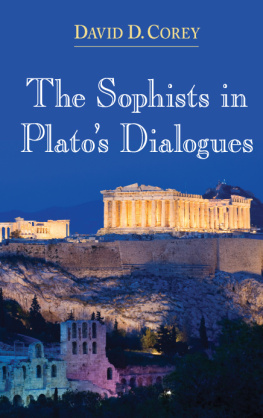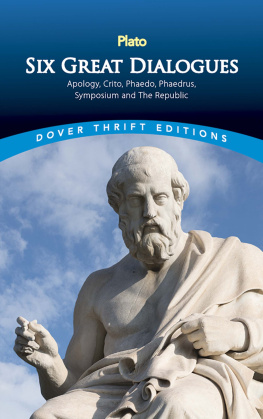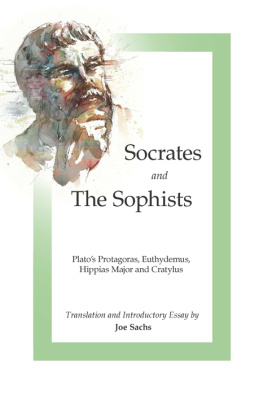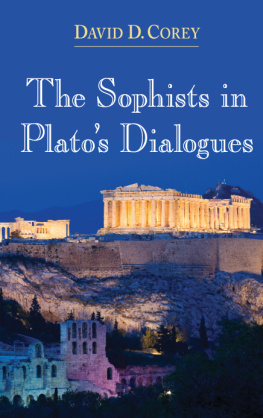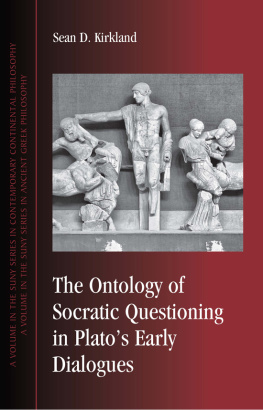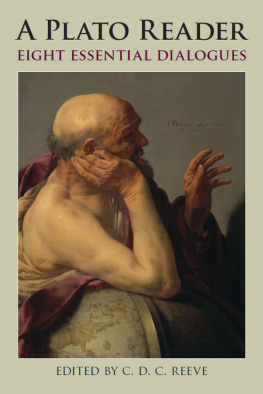David D. Corey - The Sophists in Plato’s Dialogues
Here you can read online David D. Corey - The Sophists in Plato’s Dialogues full text of the book (entire story) in english for free. Download pdf and epub, get meaning, cover and reviews about this ebook. year: 2015, publisher: State Univ of New York Pr, genre: Science. Description of the work, (preface) as well as reviews are available. Best literature library LitArk.com created for fans of good reading and offers a wide selection of genres:
Romance novel
Science fiction
Adventure
Detective
Science
History
Home and family
Prose
Art
Politics
Computer
Non-fiction
Religion
Business
Children
Humor
Choose a favorite category and find really read worthwhile books. Enjoy immersion in the world of imagination, feel the emotions of the characters or learn something new for yourself, make an fascinating discovery.
- Book:The Sophists in Plato’s Dialogues
- Author:
- Publisher:State Univ of New York Pr
- Genre:
- Year:2015
- Rating:5 / 5
- Favourites:Add to favourites
- Your mark:
- 100
- 1
- 2
- 3
- 4
- 5
The Sophists in Plato’s Dialogues: summary, description and annotation
We offer to read an annotation, description, summary or preface (depends on what the author of the book "The Sophists in Plato’s Dialogues" wrote himself). If you haven't found the necessary information about the book — write in the comments, we will try to find it.
The Sophists in Plato’s Dialogues — read online for free the complete book (whole text) full work
Below is the text of the book, divided by pages. System saving the place of the last page read, allows you to conveniently read the book "The Sophists in Plato’s Dialogues" online for free, without having to search again every time where you left off. Put a bookmark, and you can go to the page where you finished reading at any time.
Font size:
Interval:
Bookmark:

THE SOPHISTS IN PLATOS DIALOGUES
THE SOPHISTS IN PLATOS DIALOGUES
DAVID D. COREY

Published by State University of New York Press, Albany
2015 State University of New York
All rights reserved
Printed in the United States of America
No part of this book may be used or reproduced in any manner whatsoever without written permission. No part of this book may be stored in a retrieval system or transmitted in any form or by any means including electronic, electrostatic, magnetic tape, mechanical, photocopying, recording, or otherwise without the prior permission in writing of the publisher.
For information, contact State University of New York Press, Albany, NY
www.sunypress.edu
Production, Jenn Bennett
Marketing, Michael Campochiaro
Library of Congress Cataloging-in-Publication Data
Corey, David D.
The sophists in Platos Dialogues / David D. Corey.
pages cm
Includes bibliographical references and index.
ISBN 978-1-4384-5617-1 (hardcover. : alk. paper)
ISBN 978-1-4384-5619-5 (ebook)
1. Plato. Dialogues. 2. Sophists (Greek philosophy) I. Title.
| B395.C654 2015 184dc23 | 2014022078 |
10 9 8 7 6 5 4 3 2 1
To my teachers of Greek
Matthew Christ, Nate Greenberg, Jim Helm, and Tom VanNortwick
And to Cecil Eubanks
CONTENTS
ACKNOWLEDGMENTS
T his book was made possible in part by a generous research leave from Baylor University and through the expert assistance of numerous graduate students at Baylor, especially Matt Dinan, Patrick Cain, Josh King, and Corrine Peters. Several friends and colleagues commented on parts of the manuscript along the way. Rob Miner, Jake Howland, Mary Nichols, Catherine Zuckert, and Cary Nederman were especially helpful. Avi Mintz at the University of Tulsa deserves special thanks for reading the entire manuscript, offering detailed comments, and tirelessly pressing me to get this book in print.
Above all, I thank my wife, Elizabeth Corey, who has read the entire book multiple times and been an unwavering source of support and inspiration.
Earlier versions of appeared respectively in History of Political Thought 29, no. 1 (2008): 126; and in Christopher A. Dustin and Denise Schaeffer, eds., Socratic Philosophy and Its Others (Lanham: Lexington Press, 2013), 91114. They appear here with the kind permission of these presses.
David D. Corey
Waco, Texas
May 2014
ABBREVIATIONS
ABBREVIATED TITLES FOR WORKS OF PLATO
| Ap. | Apology |
| Charm. | Charmides |
| Crat. | Cratylus |
| Cri. | Crito |
| Euthyd. | Euthydemus |
| Euthphr. | Euthyphro |
| Gorg. | Gorgias |
| Hipp. Maj. | Hippias Major |
| Hipp. Min. | Hippias Minor |
| Lach. | Laches |
| Men. | Meno |
| Phd. | Phaedo |
| Phdr. | Phaedrus |
| Prm. | Parmenides |
| Prt. | Protagoras |
| Rep. | Republic |
| Symp. | Symposium |
| Soph. | Sophist |
| Tht. | Theaetetus |
OTHER ABBREVIATIONS
| DK | Diels and Kranz, Die Fragmente der Vorsokratiker |
| DL | Diogenes Laertius, Lives of Eminent Philosophers |
| EN | Aristotle, Nicomachean Ethics |
| Il. | Homer, Iliad |
| Mem. | Xenophon, Memorabilia |
| Nem. | Pindar, Nemean Ode |
| Od. | Homer, Odyssey |
| Th. | Hesiod, Theogony |
| TLG | Thesaurus Linguae Graecae |
| WD | Hesiod, Works and Days |
ONE
INTRODUCTION
T radition ascribes thirty-five dialogues to Plato, and more than half of them (21) touch on the theme of sophistry in one way or another. In some dialogues, Plato casts the sophists as leading interlocutors of Socrates; in others they are mentioned for their intellectual tendencies and pedagogical practices. Frequently Plato exposes readers to hearsay about the sophistssometimes friendly, sometimes hostile. At times he has Socrates defend them, but not always. And, constantly, he hints at the many ways in which Socrates seems both like and unlike the sophists. The richness and frequency of Platos handling of the sophists gives rise naturally to certain questions: What was Platos purpose in presenting these controversial figures? What was his view of them? And how did he expect readers to understand their relationship to Socrates?
This book springs from the suspicion that such questions have not been adequately answered. The dominant and indeed almost universally held view is that Plato was the sophists implacable foe, that he presented them in his dialogues in order to discredit them, and that his campaign against them was motivated by a deep desire to separate what he regarded as the sham wisdom of the sophists from the genuine wisdom of his teacher, Socrates. This view no doubt has its attractions, not least of which is that it captures something of a dramatic, almost epochal struggle for the soul of Athens and the integrity of philosophy in Platos handling of the sophists. But how well does it ultimately line up with evidence from the dialogues?
but it is also tendentiousor so readers of this dialogue should understand. For it fails to accommodate the full range of sophistic traits that Theaetetus and the stranger had outlined over the dialogues labyrinthine course. Moreover, and just as importantly, around the midpoint of the dialogue, Theaetetus and the stranger hesitatingly agree that Socrates (or some group of figures indistinguishable from Socrates) should be classed among the sophists for attempting to educate the young by means of a purgative art of refutation (231ac). One thus wonders: Why would Platos chief dialogue on the sophists (if the Sophist can be described that way) dismiss these figures on obviously tendentious grounds and, at the same time, allow Socrates to appear vexingly intermingled with them, if his purpose were indeed to distinguish Socrates and the sophists once and for all?
Platos handling of sophistry in the Meno raises similar questions. When Socrates there suggests to Anytus that people who want to learn virtue or excellence (aret) might do well to consult the sophists, Anytus reacts with horror: the sophists are plainly the ruin and corruption of those who associate with them! Anytus responds notoriously that he has in fact never had any experience of the sophists at all. To which Socrates reasonably retorts that Anytus must be some kind of prophet; for how else could he know whether there is something good or bad in a matter of which he has no experience? Thus is Anytus revealed to be a thoughtless proponent of a mere prejudice against the sophists. But, again, why would Plato have Socrates stand up for the sophists in this way if his goal were to discredit them?
Or consider Platos fascinating presentation of the sophist, Prodicus. Though there is no dialogue called the Prodicus, this sophist is treated in more than a dozen different places in the Platonic corpus, once as a character in the
Font size:
Interval:
Bookmark:
Similar books «The Sophists in Plato’s Dialogues»
Look at similar books to The Sophists in Plato’s Dialogues. We have selected literature similar in name and meaning in the hope of providing readers with more options to find new, interesting, not yet read works.
Discussion, reviews of the book The Sophists in Plato’s Dialogues and just readers' own opinions. Leave your comments, write what you think about the work, its meaning or the main characters. Specify what exactly you liked and what you didn't like, and why you think so.

